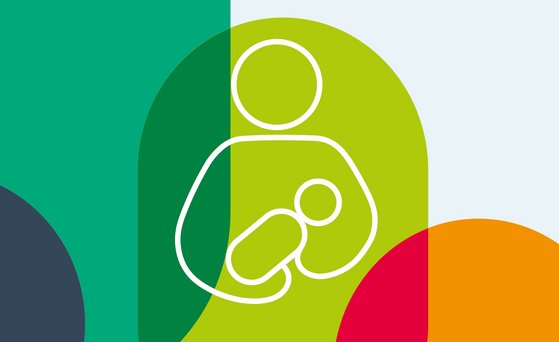Pregnant women and breastfeeding mothers

More and more people are following a diet with a high proportion of plant-based foods. So far, howev-er, there are only a few meaningful study results on plant-based diets with regard to food consumption, nutrient status and long-term health effects. In particular, there is a lack of data on the nutrient supply of (expectant) mothers and their (unborn) children and its influence on child development.
Sub cohort "Pregnant Women and breastfeeding Mothers"
In order to close this data gap, the COPLANT sub cohort "pregnant women/breastfeeding mothers" will be conducted at the following locations: study centres at the German federal Institute for Risk Assessment in Berlin (BfRshort forGerman Federal Institute for Risk Assessment) and at the universities in Jena and Vienna. Around 400 pregnant women will be comprehensively examined from the 30th week of pregnancy until their children's second birthday.
Women who have been following one of the four diets for at least one year before the onset of their pregnancy can participate:
- Vegan: plant-based products, no animal products
- Vegetarian: plant-based products, no meat or fish, but milk, milk products and/or eggs
- Pescetarian: plant-based products, no meat, but fish, milk, dairy products and/or eggs
- Mixed diet (omnivorous): animal and plant products
Examination dates
A total of five appointments are planned for the women, participating "pregnant women/breastfeeding mothers" sub cohort. Data assessment begins with two appointments during pregnancy (30-35 weeks of pregnancy). Here, data is collected from the expectant mother using various methods:
- Computer-assisted questionnaires (e.g., eating habits, health)
- Interviews (e.g., medication and supplement intake)
- Assessment of body measurements and clinical parameters (e.g., height, body weight, blood pressure, pulse, hand grip strength, bone health)
- Dietary habits were recorded using a two-day weighed food protocol (NutriDiary app)
- Collection of biosamples (blood, urine, faeces)
At the Jena study centre, part of the placenta is also collected immediately after birth in order to ana-lyze the distribution of fatty acids and establish links between the supply of these important nutrients to the mother and her unborn child.
The third examination takes place at the 3rd/4th month of the child's life. Here, comprehensive data is again collected from the mother. Questionnaires are used to assess the mother's eating habits, infor-mation on the child's nutrition and the state of health after the birth. The intake of medication and sup-plements is again recorded in a short interview. Maternal body measurements and clinical parameters are also assessed again (e.g., body weight, blood pressure, pulse, bone health, body composition). The mother's eating habits are recorded again using an app-supported weighed food protocol (NutriDiary app) and biosamples are collected (breast milk, blood, urine, faeces). Anthropometric data of the child is taken from the Child Health Record. In Jena, Berlin and Vienna, the collection of a urine sample and a stool sample from the child is also planned.
Around the child's first birthday, an online questionnaire is used to collect information about the moth-er's and child's nutrition, intake of medication and supplements, state of health, development and pos-sible illnesses of the child.
The fifth appointment takes place around the child's second birthday at the study centre. Computer-assisted questionnaires are used to assess information on the child's development and general state of health. In addition, body measurements and clinical parameters of mother and child are documented (e.g., body weight, blood pressure, pulse, body composition). In Jena, Berlin and Vienna, another urine sample and a stool sample are collected from the children.
Aim of data collection
The aim of this complex data collection is, on the one hand, to investigate associations between the mother's eating habits and energy and nutrient supply and the progression of pregnancy, birth and breastfeeding. On the other hand, eating habits and the child's nutrient intake will be investigated. The study will also investigate how nutrition has an impact on the development of children up to their sec-ond birthday.
The range of study parameters to be investigated is very wide, on the one hand from the detailed as-sessment of energy and nutrient intake from the weighed food protocols, but also the determination of other parameters:
- the nutritional status
- thyroid function
- bone metabolism
- pollution
- cardiovascular risk factors
In addition, the diets are analyzed to assess the composition of the microbiome (the entirety of all mi-croorganisms, e.g., bacteria or viruses, that colonize humans) and to investigate its influence on physio-logical functions.
Data from the COPLANT sub cohort "pregnant women/breastfeeding mothers" provide a basis for nu-tritional recommendations for optimal energy and nutrient intake during the vulnerable phases of preg-nancy and breastfeeding.
Study Centres "Pregnant women and breastfeeding mothers"
If you are interested, please contact one of the following study centres:
Human Study Centre for Consumer Health Protection
Max-Dohrn-Straße 8-10 * 10589 Berlin
Phone: +49(0)30/184 12-550 11
E-Mail: coplant@bfr.bund.de
Study Centre at the Institute of Nutritional Sciences
Dornburger Str. 27/29 * 07743 Jena
Phone: +49(0)3641/9-496 56
E-Mail: coplant@uni-jena.de
Department of Nutritional Sciences
University of Vienna
Josef-Holaubek-Platz 2 (UZA II)
A-1090 Vienna
Phone: +43(0)1-4277/549-79
E-Mail: coplant.ew@univie.ac.at